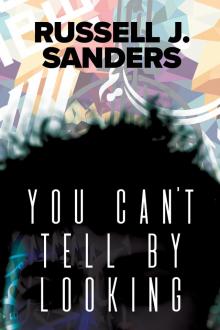- Home
- Russell J. Sanders
You Can't Tell by Looking Page 2
You Can't Tell by Looking Read online
Page 2
“We don’t shake hands,” he says, “but we fist-bump.” He holds his fist up, and I bump it. “My name’s Kerem.”
“Good to know you, Ker.” His face squinches up. I guess I shouldn’t have shortened his name like that. But it’s what I do. I determine to pile on the charm and make it all right. “Gabe. And I am sorry. About before. And shortening your name like that.”
“The name thing’s okay. I’ve just never had anyone do that before.” He smiles. “But I kinda like it.”
I breathe a tiny sigh. Of relief? Of happiness? Of what?
“The stalking thing? We can’t be too careful. Lots of haters out there. Some of them at Compton.”
“But I hear you’re class president, so there can’t be too many of them.”
“Only takes one, Gabe; only takes one.” As he talks, he takes up his prayer rug, rolls it, and puts it back in its canvas bag.
He turns toward the sidewalk and motions for me to join him.
“So tell me about these prayers. What language was that?”
“Arabic. My dad’s Turkish, and I don’t speak Arabic fluently, but the Holy Quran was given to Muhammad in Arabic, so Muslims always pray in that language because our prayers are verses from the book. At the end, we can speak in our native language to ask Allah for favors or blessings or whatever we need to say to Him.”
“But you didn’t say anything after you did that thing where you turned your head to the sides. What’s up with that?”
He laughs. “Tell you the truth, when I heard you—that’s some stomach you got there; it would attract a hungry walker in a millisecond—I was praying silently, ‘Please don’t let him hurt me, please don’t let him hurt me.’ I’m not exactly trained in tae kwon do.” He laughs again, and it’s a joyful, at-ease expression that tells me we are going to be friends, Ker and I.
“You like The Walking Dead? Best damn show ever.”
“Wouldn’t miss it. I watch the streaming episodes over and over,” Kerem says.
“You’re kidding. That’s about the only show I have on my Netflix watch list.”
“Be still my heart. A Dead fanatic like me.” He puts his hand on his heart. “But I didn’t answer your question. The head-turning thing?” He looks at me with a smile. “We’re talking to angels who sit on our shoulders. I know, I know… it sounds weird, but it’s just part of our religion, and if you know anything about any religion, there are a lot of unexplainable things going on in all of ’em. Besides, when we pray in groups, like in our mosques—that’s what we call our churches—we are actually speaking to the people on either side of us, wishing them peace, for the Arabic words translate to ‘may the peace, mercy, and blessings of Allah be upon you.’”
“Just like in our church. At the end of the service, we do what we call ‘giving the peace.’ We turn to the people near us and wish them well.”
“Exactly.”
“Only we worship God. You worship Allah.”
“Allah is Arabic for God. We worship the same God you do. You know Abraham? In your Bible?”
Despite the fact Mom and Dad have always taken me to church, I’m not much of a Bible scholar, but I do know that story. “The guy who God told to sacrifice his son, and he almost did it.”
“Yeah, that’s him. Forgive my guessing that you’re a Christian. I suppose you could be an atheist, Buddhist, or whatever, but we don’t have a lot of those, if any, in our school. What denomination?”
“Methodist, born and raised. But my parents aren’t the kind to be at the church every time the doors are open.”
“Mine aren’t either. Some Muslims are at mosque half their waking hours, or at least it seems, because they are so devout.”
“Sounds like my grandparents. I think their devotion pushed Dad away from the church until he met Mom. Now they go regularly, but they’re not church-crazy.”
Kerem smiles at that. “Sounds a lot like my family. Oh, we do go to mosque regularly, but our traditions are pretty modern—American, you might say. There are a zillion different ways to be Muslim. Each country, sometimes each community, and yes, each family, has their own traditions. I suppose my family has adapted—a little bit old-world, a lot new.
“But we were talking about Abraham. Muslims are descended from Abraham, just as Jews and Christians can trace the beginnings of their beliefs to him as well. Lot of similarities. I’ll tell you sometime if you’re interested.”
“Ker,” I say again, and he smiles at me. “We’re on.” I would listen to him read the dictionary to me if it meant I could hear his voice and be in his presence. “But maybe right now, you can get me up to speed about Compton. Seems like a good school. Of course, I’ve only been there one day. My cousin Shaun—Shaun Gray, you may know him—” A slight quiver in Ker’s body stops me.
“Oh, I know him.” I can’t read much into his tone, but from what Shaun was spouting earlier, I wonder if Kerem has either heard something about Shaun and his attitude or actually encountered Shaun at some point. I do know that I want to distance myself from that sort of thing.
“Look, Ker, Shaun can be a hardass. I don’t know him real well. He’s helped me a lot, easing me into this move, but before that, I’d only seen him a couple of times a year as we grew up. Just know that whatever you think of Shaun, I’m not him, I’m not like him, and apparently I wasn’t raised like he was. ’Nough said?”
“Okay. Good to hear. Because if you’re going to be living right across the street from me, we’ll be seeing a lot of each other. Who knows? We might feed our addiction with a Walking Dead date in our future.”
Chapter 2
Kerem
“WHAT’S WITH the scarf? Having a bad-hair day?”
My sister is looking very traditionally Muslim as she waltzes into the breakfast room this morning. Something’s up.
My cousin Timur, who lives with us, says, “It’s called a hijab, Kerem.”
“I know, kuzin.” I roll my eyes at Timur. “I’m just funnin’ with my sister. Is that okay with you?”
He doesn’t respond. Sometimes it’s hard to communicate with Timur. He’s a year older than me, and he’s lived with us for nine years. You’d think we’d be like brothers by now, and in some ways we are, but in other ways, I’ve always felt we just don’t connect. Still, I tell myself to tone it down. Mama would not like it if Tim and I got into it this sunny morning.
“You look lovely, dear,” Mama says.
“Aysel, my love,” Dad says, “you would be beautiful no matter how you dressed.”
“Oh, Baba, you are decidedly prejudiced. I could be ugly as the cadi in the forest, a giant wart on my nose, and you would say I’m beautiful.” There’s a lilt in her voice. My sister is, indeed, beautiful. A little ditzy sometimes, but beautiful nonetheless.
“You favor your mother, benim küçük kızım.” Dad grew up in Turkish Kurdistan, and he peppers his speech with his native language. He’s prone to call my sister “my little daughter” and me “my little son.” But strangely he doesn’t have any affectionate term for Timur. Baba is kind to Timur—after all, he took him to raise as his own—but maybe it’s because Timur is a bit standoffish that Baba treats him differently than he treats us.
“When I saw your mother for the first time,” Baba continues, “she was dressed head to toe in a burqa, complete with niqab across her face. The only part of her body uncovered was her eyes. I looked into those eyes, and I thought, ‘this is the most beautiful creature on earth.’”
“Aram, it’s a sin to tell a lie. It’s in the Quran—‘woe to every sinful liar.’ What you tell our children…. I’ve never dressed like that in my life, and you know it.” Mama’s words are stern, but there is love in them.
Baba just laughs. “I’m only joking, my dearest. Allah enjoys humor.” Then he turns his head to Aysel. “But your anne—my heart, my Maria—is beautiful, and so are you.”
Aysel turns red as a beet.
“Now, tell us why you are suddenly the obedie
nt Muslim woman. I would bet a man is involved. Am I right?” Baba probes, mischief in his eyes.
Aysel turns even redder. “Well….”
“Darling,” Mama says as she places toast in front of us, “no man has the right to tell you how to dress.”
Timur looks at Mama. I can’t read what’s in his eyes.
“I know, Mama,” Aysel answers. “I am choosing to wear the hijab. It is a symbol of my faith. It shows a reverence to Allah.”
I can see in her eyes, in her hesitation, in her body as she reaches for toast, she is withholding. “Spill it, sister.”
“Okay, okay. What I said is true. My decision to wear the hijab is mine alone, and it is for those reasons. But I have met someone.”
Baba looks at me, nodding with an I-knew-it smirk on his face.
Mama sits down with her cup of coffee. She’s eager to hear the tale of her daughter’s first boyfriend, I can see. “Well, don’t just sit there, love, after dropping such a bombshell. Tell us.”
“His name is Hasan. He was the graduate assistant who taught my summer class.” Aysel is about to be a sophomore in college. “He has seen me many times with uncovered head, so I’m not doing this entirely for him.” Ah-hah! The entirely gives her away. She obviously is trying to please her new boyfriend with the hijab. “We crossed paths when I went in to register for the fall semester, and he invited me to coffee today. Hasan comes from a very orthodox family. I could tell that from little things he said during class, even though it wasn’t a religion class at all. Anyway, I like him, and I want to please him, and I’ve felt for a long time that I would like to be stricter than our family is when it comes to traditions.” That last sentence started slow and picked up speed. Now Aysel looks down at her toast, tearing it into small pieces, waiting for a response.
“My love, if you get to know this Hasan and he makes you happy, your father and I will be very pleased. I’ve told you often enough I didn’t grow up with orthodox traditions.”
Aysel and I interrupt her in unison. “Born into a fourth-generation immigrant family, went to mosque sporadically, parents weren’t that strict.”
“Stop it, you two. Am I that predictable?” She smiles.
Aysel and I laugh.
“Enough, little ones! Your mother was talking.” She feigns anger. “Where was I? Oh, yes. Because of me, I suppose, your father has discarded much of his childhood ways, but that doesn’t mean we don’t support your decision to wear the hijab proudly. Just make sure you are doing it for all the right reasons.”
“Benim küçük kızım,” Baba adds, “we want you to be happy, and if Hasan makes you happy as you get to know him, we support you. Two things: finish your degree and make us some grandchildren. That’s all we ask any of you three.” He often includes Timur when he speaks of grandchildren, although technically Timur’s children would be nephews or nieces to Baba. I usually cringe a little when Baba gives the grandchildren speech, for I fear his only source will be Aysel.
Aysel brightens, the burden lifted. “Well, I must go. I have class at nine; then I’m meeting Hasan at ten thirty.” She is her bubbly self again as she jumps up from the table and retreats.
“And what’s new with my son?” Baba asks. “We have a few minutes before we all leave for our day, so I think a family discussion is in order.” Strange how he says it that way, like it’s some sort of business roundtable or an inquisition. But that’s just Baba’s way.
“I met the new neighbor,” I tell him.
“Which one, the man or the woman?” Mama asks.
“Neither. They have a son. My age. Started at Compton yesterday. We met after school.” I omit how he almost interrupted my afternoon prayers. “Last night, we skyped.”
“It is good that you are welcoming him to the neighborhood. You are performing a blessing, praise Allah.” Baba says this as he gets up to pour himself more coffee.
“Tell us more, dear,” Mama says. “What is he like? Do you have things in common? Is he Muslim?”
I laugh at that. “No, Mama, I’m still the only one at Compton. Diversity is still alive and well there, thanks to me.”
“It’s a good school, it’s nearby, and your father and I believe public school is best for you. So many Muslims hide their children away in private schools. Your sister and Timur, and now you, are spreading the word that we are as normal as anyone else. That’s a good thing.”
I smile at her. She didn’t grow up orthodox, and she and Baba have modified Islam a bit to fit their busy schedules and American suburban life, but they still brought us up to be good Muslims, and they want us to be role models, dispelling the notion that all Muslims are terrorists.
“I know, I know. And like most schools, Compton has its bullies, its haters, but I guess our family has taught the community something.”
“They elected you president of your class, didn’t they? Huge step toward understanding.” Baba’s so proud of my elected office. And I am too, since it’s such a popularity contest. I guess people like me.
“You were going to tell us about this new neighbor,” Timur says. He usually changes the subject when my parents talk about my popularity.
“Oh, yeah. His name is Gabriel—”
“Like the angel who brought the divine revelation to Muhammad, PBUH,” Mama says.
That means “peace be upon him,” and we Muslims always add that when speaking the name of the prophet—or at least think it. Or when we speak of any of the prophets—Moses, Abraham, Jesus, or the rest. They are all revered in Islam.
“Yes, Mama, like the angel. Gabe is a swimmer, and he plans to be on the team this year. He won medals on the team at his last school. His parents are Methodists, and they go to church mostly, he said, regularly. He wants to know more about Islam, and I told him I’d tell him anything he wanted to know. What else? He’s about my height, sorta sandy hair, sea-blue eyes, and freckles across his nose.” I stop, wondering why I added that description of him.
“Well, he sounds like a very nice young man, dear. And quite handsome.” She doesn’t make much of my detailed description, and I’m glad.
“Timur, how’s the new job?” Baba turns his inquisition to my cousin.
“Okay. Boss seems to like me. Or at least he likes what I can do on the computer.”
“Well, it’s a great honor to be hired in as the computer consultant for that firm. Most men your age would need a degree for such a position, but you’ve proven yourself with skills. I’m proud of you.”
“Thank you, Amca Aram.” I see a trace of pleasure on Timur’s face. He is pleased with Baba’s praise. That makes me feel good for him.
“And now,” Baba says, as he pushes his chair from the table, “we have to get to our offices. Another day of healing, if it pleases Allah, is beginning for us. You boys make your lunches and get out of here. Never, ever be late, be it for prayers, school, or your jobs.” Baba means what he says, but he, like the rest of us in this busy world, is sometimes unavoidably late for prayers.
As he and Mama leave, I begin to make chicken sandwiches. I turn to Timur. “You want me to make you a sandwich for lunch, Tim?”
He takes a last gulp of coffee and rises. “No, I’ll get something out. I’m going to go brush my teeth, and then I’ll drive you to school if you want.”
“Sure.” I enjoy walking home so I can pray by the stream, but Tim takes me to school most every morning. I finish the sandwiches and bag them as I wait for him to finish with his teeth. He’s very particular about his hygiene. He brushes after every meal, while I brush before morning prayers and sometimes forget to do so later in the day.
THE MORNING at school goes well. We have morning activity period, a time for finishing homework or club meetings or parent conferences. This morning, my cabinet and I meet to discuss our fall fund-raiser. This year we’ve decided to raise money for flooding and tornado victims. So many people across the nation have been devastated by weather this past summer that we feel we need to help them, if only
in a small way. We’re hoping to divide what we raise between two organizations: one for flood relief, the other for tornado-ravaged folks. We discuss how, even though we will be raising funds all year long for these causes, the wheels of FEMA and other government agencies move so slowly that money given in nine months will be as welcome as donations given now. I’m particularly happy about my fellow class officers’ enthusiasm, because charity is one of the most important things in Islam. In fact, one of the things Islam is based on is zakat, the giving of money to the poor. Like tithing in Christian religions. Helping others is so important, and we can help anyone of any faith, anyone who is in need.
Lunchtime comes around, and I head to the library. Gabe gets there before me. Our paths crossed before school. Well, actually I was looking for him, and I was so glad when I saw him. I quickly told him I’d be in the library during lunch period and he should meet me there, but I didn’t fill him in on why. I was glad he didn’t ask because explaining’s easier in person.
The librarian calls out, “How’s it going, Kerem? Having a good morning so far?”
“Really good, Ms. Fox, really good.”
“Who’s your friend?”
I introduce Gabriel as the new student at Compton.
“Good to meet you, Gabriel. You’ve made a good friend already.” She looks at me. “Room’s all ready.”
“Come with me,” I tell Gabe. And the two of us enter the small workroom of the library. Long ago, when I came to Compton, I asked the principal if there would be a private place for me to do my noontime prayers. He talked to Ms. Fox, and she agreed her workroom would be a good spot for me. She even pushes her worktable out of the way each day before I arrive. Afterward, I put it back for her. She is such a good person, and I appreciate having her in my life.

 Colors
Colors Titanic Summer
Titanic Summer All You Need Is Love
All You Need Is Love You Can't Tell by Looking
You Can't Tell by Looking